SUVs accounted for 44% of all new cars sold in Europe in January, an all-time record, according to Jato Dynamics.
Data for 27 markets across the region shows that there were 839,525 units registered in January 2021, down by 26% compared to the same period in 2020 – the lowest result for January since 1982.
Felipe Munoz, global analyst at Jato Dynamics, said: “Despite efforts made by governments and OEMs to boost the registration of pure electric cars, it has not been enough to offset the impact of the global pandemic and local lockdowns.”
Car dealerships across the continent also continued to feel the negative effects of the Covid-19 pandemic.
In key markets such as Germany and Spain, volume dropped by 32% and 52% respectively.
Despite the overall negative trend, there were a few exceptions. In Sweden, volume increased by 23% compared to January 2020. This came as a result of changes to Sweden’s bonus-malus taxation policy (introduced on January 1, 2020), which caused an increase in vehicle registrations in December 2019, as customers took advantage of the favourable taxation that would no longer be in place for high-emissions vehicles.
In Norway, registrations increased by 8% as consumers were once again able to visit showrooms, and demand for EVs continued, fuelled by heavy incentives.
SUVs started the year with a success story, accounting for 44% of all new passenger car registrations in January – the highest share ever recorded for SUVs.
Munoz said: “The demand for SUVs shows no signs of stagnation, and Europe is showing similar patterns of growing popularity to those seen in the USA and China.
“Considering their higher prices and emissions levels, the results are particularly noteworthy.”
In total, the volume of SUVs amounted to 368,100 units, down by just 18% compared to January 2020.
Small SUVs accounted for 36% of total registrations, with volume falling by 18%. While compact SUVs made up the majority of demand with 177,500 units, also down by 18%.
Midsize and large/luxury SUVs made up 15% of total volume for SUVs, with 56,800 units – down by 20%.
Volkswagen, Peugeot and BMW were the top-selling SUV brands in January, but Ford, in fourth position took first place for market share growth.
By manufacturer, Volvo gained the largest market share, following increases in the demand for its SUVs and midsize cars.
The Volvo XC40 was Europe’s top-selling premium vehicle last month – its volume soaring by 58% to 10,590 units. Conversely, Volkswagen Group fell by 0.9 points due to its exposure to the German market, which favoured the Volkswagen Golf, Europe’s top-selling car in 2020.
January also saw notable shifts across the model rankings. The Golf dropped three positions and started the year as the fourth best-selling car, behind the Toyota Yaris, Peugeot 208 and Dacia Sandero.
The Peugeot 2008 topped the SUV rankings, up by a significant 87% in contrast to the 7% and 2% drops seen by its competitors, Volkswagen T-Roc and Renault Captur respectively.
Other models that posted significant increases included the Ford Puma (+72%), Ford Kuga (+258%), BMW X3 and Kia Niro (+12% each), Mercedes GLA (+18%), Suzuki Ignis (+25%), Smart Fortwo (+208%) and Porsche Macan (+23%).
Among recently launched cars, the most registered were the Mercedes GLB (3,802 units), Volkswagen ID.3 (2,909 units), Cupra Formentor (2,826 units), Citroen C4 (2,491 units), BMW 2-Series Gran Coupe (2,409 units), Polestar 2 (1,290 units), Porsche Taycan (1,017 units), Toyota Proace City Verso (915 units), Audi E-Tron Sportback (908 units), and Land Rover Defender (871 units).

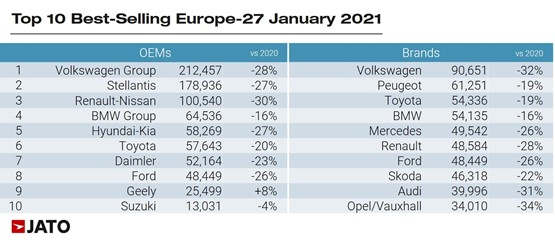
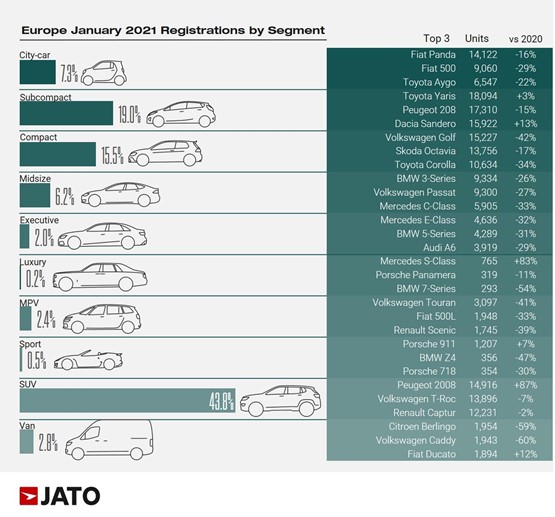
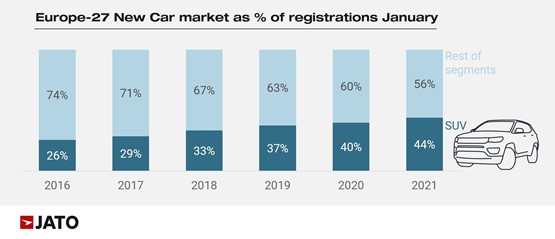
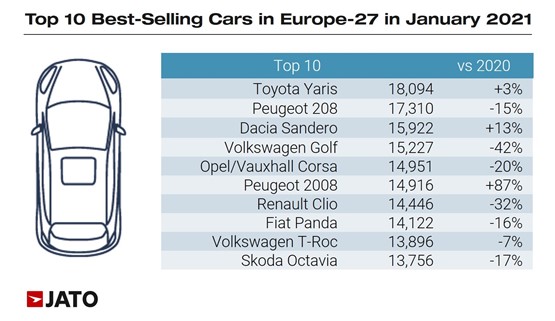



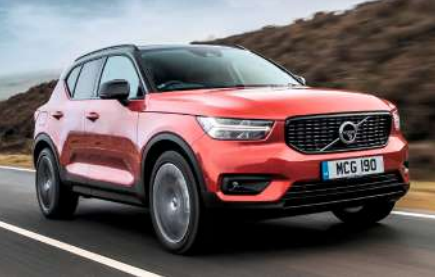



















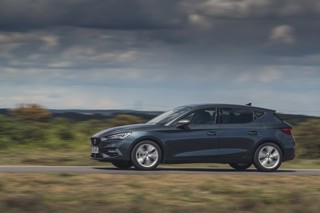
Marc Schwartz - 25/02/2021 11:50
What is a SUV today? its certainly not what an SUV was several year ago..... Seems Manufacturers put a bit of plastic cladding, add a coupe'ish rake to the rear and raise the ground clearance by millimetres then call it a SUV!